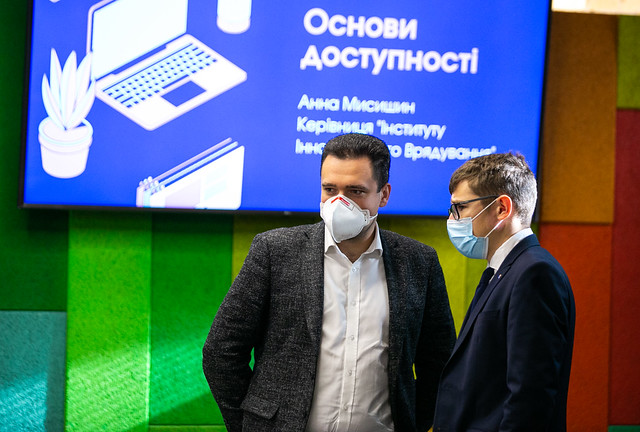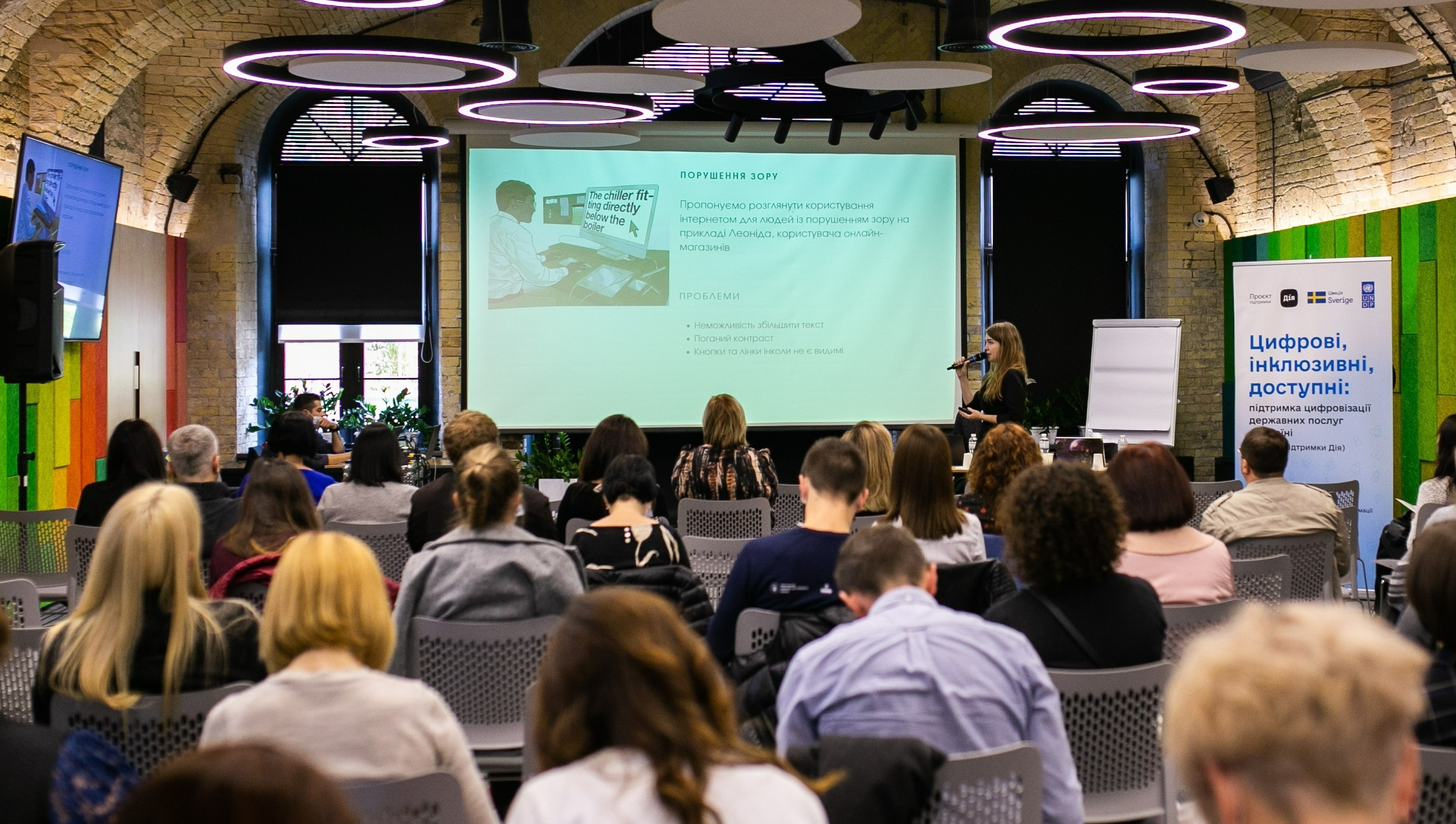The training event aimed to raise government officials’ awareness of web content accessibility standards
Photo: Mariia Burlaka / UNDP in Ukraine
Kyiv, 7 October 2021 – Two hundred and thirty civil servants and government officials from across Ukraine have been trained how to make web sites and other digital resources inclusive. The United Nations Development Programme (UNDP) conducted this training event from 4 to 8 October in Kyiv, with financial support from the Swedish government.
At the opening of the training session, Oleksandr Shelest, the deputy Minister of Digital Transformation responsible for the development of digital infrastructure, said that ensuring barrier-free access to online services is one of the main goals set by the Cabinet of Ministers of Ukraine.
“The vision of the Ministry of Digital Transformation is to make the provision of government services convenient, hassle-free and friendly. But this is only possible if you have barrier-free access. Because if government services are convenient and hassle-free, but are inaccessible to every Ukrainian, that’s not right,” said Shelest. “This training event aims to make every government body understand the importance of making government services barrier-free, and information about each government body accessible to everyone.”
Shelest pointed out that a law defining access to the Internet as a universal service was recently adopted. The Ministry of Digital Transformation is currently working with the Ministry of Social Policy to promote tools that will guarantee that the country’s regions have the ability to connect to the Internet.
The training session consisted of two modules, each of which contained 10 lectures on various aspects of web content accessibility. Among other things, the participants learned about the basics of web content accessibility: the assistive technologies used by people with disabilities, guidelines and legislation on digital accessibility, as well as common myths and misconceptions.
The second module focused on specific topics, in line with the participants’ specializations. Content creators learned how to make online publications accessible (for example, what colours and contrasts to choose, how to include alternate versions for images and graphics, and what special features Word and PDF have). Those developing IT solutions learned the principles for creating accessible interfaces: how to develop a user-friendly interface, what visual design and interactive elements it should have, and how the accessibility of an interface can be tested.
“The COVID-19 pandemic has drawn everyone’s attention to the fact that information on the Internet should be accessible and barrier-free so as a person can use any service,” said Ulyana Tokaryeva, a representative of Tetiana Lomakina, advisor and commissioner of the President of Ukraine for the Barrier-Free Environment. In this context, it is important to enhance the capacity of those civil servants who every day provide citizens with access to public information or government services, she said.
Volodymyr Brusilovsky, manager of the DIA Support Project, said that UNDP was assisting ministries, in particular the Ministry of Digital Transformation, in their work to make digital services in Ukraine inclusive, enabling a greater number of people to use them.
“This was the first training session on digital accessibility,” said Brusilovsky. The training event sought to teach people how to make content accessible, and how to build and upgrade information systems that public authorities work with (such as web sites, mobile applications and portals) so as to make them accessible. After all, the main thing is to make sure that people from vulnerable groups are not forgotten during the development of digital transformations.
The trainers were Dmytro Popov, a digital accessibility specialist from the Barrier-Free Ukraine Resource Centre; Anna Mysyshyn, head of the Institute of Innovative Governance, an NGO; Viacheslav Shestopalov and Yevhen Shykiriavyi, ELEKS design managers and authors of the inclusive design course; Valeriia Panina, a UX and visual communications specialist from Ukraine’s Virtual Assets Project Office at the Ministry of Digital Transformation of Ukraine; and Roman Borenko, the director of Inclusive IT.
The training session was attended by employees responsible for posting publications on official web sites and social networks, as well as by web site administrators and IT solution developers.
The training session was held at the initiative of the Ministry of Digital Transformation of Ukraine and as part of the Digital, Inclusive, Accessible: Support to Digitalisation of Public Services in Ukraine Project (DIA Support Project), implemented by UNDP with the financial support from the Swedish government.
Background information:
In 2020, UNDP conducted the first study of the accessibility of e-government services and tools for the citizens of Ukraine. Within the scope of the study, 82 web sites and seven service platforms in Kyiv were tested.
The study revealed that most government web sites are only partially adapted to the needs of people with disabilities. The paper also contains a number of recommendations aimed at improving the accessibility of e-government services and tools.
UNDP also conducted a study that aimed to search internationally for the best practices in mobile accessibility. An analysis of policies on technical standards and guidelines on mobile accessibility in 14 countries provided recommendations for implementing suggested practices into Ukrainian legislation.
You can find infographics about digital accessibility in Ukraine that draw on the above studies on UNDP’s web site.
Media enquires:
Yuliia Samus, UNDP in Ukraine Communications Team Leader, yuliia.samus@undp.org or +38 097 139 1475


 Locations
Locations




